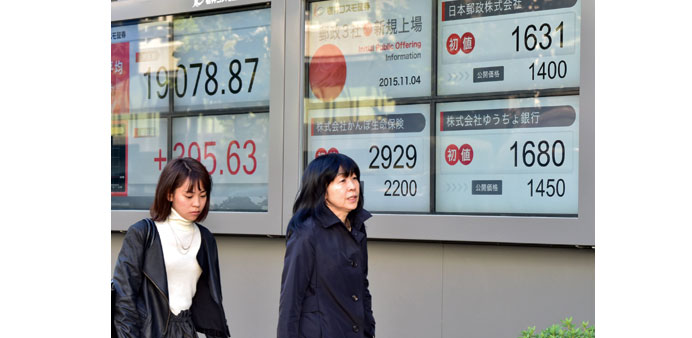Pedestrians walk past a share prices board displaying prices of Japan Post Holdings (¥1,631), Japan Post Bank (¥1,680) and Japan Post Insurance (¥2,929), in Tokyo yesterday.
AFP
Tokyo
Investors sent Japan Post stocks soaring when they made their long-awaited Tokyo trading debut yesterday, while Shanghai stocks surged more than 4% on details of China’s next five-year plan.
Shares in the vast Japanese company – along with those in its banking and insurance units – were listed on the Tokyo Stock Exchange following a $11.5bn initial public offering.
The shares in Japan Post Holdings soared 25.7% from the IPO price to ¥1,760 ($15.50), while its banking unit jumped 15.2% from the offering price to ¥1,671.
But the hotly anticipated insurance unit’s offering skyrocketed 55.9% to close at ¥3,430.
The bulk of the proceeds from share sales in the government-owned behemoth, which has about 24,000 offices nationwide, are earmarked for reconstruction after Japan’s 2011 quake-tsunami disaster.
The benchmark Nikkei 225 index closed up 1.3%. Japan Post’s IPO was the largest globally since Chinese e-commerce giant Alibaba’s record $25bn debut last year.
Bucking the trend in Tokyo, shares in Japanese airbag maker Takata plunged after top client Honda dumped it as an airbag parts supplier and US regulators slapped it with a record fine.
Takata shares ended the day 13.4% down at ¥1,189, their lowest close this year.
Chinese investors meanwhile shrugged off signals of lower economic growth from President Xi Jinping, who said annual expansion of only 6.5% would be enough.
China’s ruling Communist party late Tuesday issued guidelines for its 2016-2020 development plan, including calling for liberalisation in capital markets and in the foreign exchange regime.
Shanghai put on 4.31%, further bolstered by the announcement of plans for the first meeting between the presidents of China and Taiwan since 1949. Taiwan’s weighted index closed up 1.65%. Stocks in the Hong Kong and Shenzhen markets rallied following an announcement by the head of China’s central bank that a trading link between the two southern Chinese cities would start this year.
But the gains were pared when the People’s Bank of China later updated the website posting of Zhou Xiaochuan’s comments, clarifying that it was based on an internal speech he delivered in May. Hong Kong’s Hang Seng Index closed up 2.15%, while the Shenzhen Composite Index finished 5.12% higher. Ronald Wan, chief executive officer of Hong Kong-based Partners Capital International, sounded a note of caution about the proposed link, citing a similar scheme linking the Hong Kong and Shanghai markets.
“Optimism may wane soon given what has happened to the Hong Kong-Shanghai Connect. Regulatory investigations into the financial industry, as well as weak confidence in mainland stocks, may keep investors away.”
Sydney closed flat, while Seoul ended 0.21% higher. In currency markets, Malaysia’s ringgit strengthened 0.51% against the dollar yesterday, boosted by resurgent oil shares on Wall Street. It is Asia’s only major net oil exporter.
The Korean won, Thai baht, Aussie dollar and Taiwanese dollar also enjoyed a boost against the US unit. But the New Zealand dollar fell on unexpectedly poor jobs figures.
Oil prices fell in Asia yesterday as investors weighed US petroleum industry data showing a build-up in crude stockpiles, and news that shipments from a Libyan port were halted due to political tensions. US benchmark West Texas Intermediate for delivery in December was down 28 cents at $47.62, and Brent crude for December was trading 44 cents lower at $50.10 at 0840 GMT.

